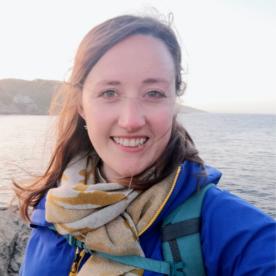Registrant profile: Alexandra Cooke CEnv
Alex’s career to date
I started my career as an Environmental Soil Scientist for a consultancy in Newcastle after completing an MSc in Land Reclamation and Restoration at Cranfield University. I loved the variability of the projects I was working on, and the early experiences I got in this role have followed me throughout the rest of my career. It was also here that I began to understand how important obtaining chartership is to being a trusted professional working in industry, and so I started working towards achieving Chartered Environmentalist (CEnv) very early on.
Eventually I was swayed to return to Cranfield University to undertake a PhD focused on developing a product to mitigate the impacts to waterways from soil erosion and phosphates, coming from agricultural lands as diffuse pollution. This allowed me to work at both a field and catchment scale, and on completion was of interest to the catchment management team at Severn Trent Water where I began working as a Catchment Management Scientist in 2018, and who allowed me to continue developing the product as part of my role. Throughout my PhD I continued to work towards CEnv registration and I’m so glad I did as it was particularly valued and respected by Severn Trent Water.
In my time at Severn Trent, I progressed to Principal Catchment Scientist and was responsible for designing and implementing the company’s catchment management programme and ambitions, as well as innovation, PR24 planning and strategy creation, including helping to develop our natural capital approaches. This involved engaging and working with farmers and landowners (in-hand, tenanted and third party), as well as eNGOs, trusts and regulators. Working in this role provided me a very diverse skillset and allowed me to take on my current role as Head of Natural Capital at The Devonshire Group.
As a brand-new post for the Devonshire Group, it is an emerging and dynamic role which sees me integrating natural capital approaches into all areas of the group. This includes in the management of our large estates, such as Chatsworth and Bolton Abbey, as well as our tenant farming community, property development teams, distinct projects, and with our large visitor contingent. We want to ensure that our estates can provide for the estate itself, as well as the landscapes and catchments that they sit within, and local communities.
Looking ahead
There are too few environmental professionals out there to deal with all of the issues of today and the future. I really hope that in 5 years’ time we are well on track to hit the UK Government’s environmental targets (or indeed surpassing them!), but we really need to get more people into environmental roles and with greater diversity of experience now if we are to stand a chance. I hope I am contributing to this at least a small bit by involving myself in the IAgrE Diversity and Inclusion (D&I) committee.
For me relationships and communication are key to solving many of our environmental issues, and so I hope that I am facilitating diverse, powerful and long-lasting partnerships which have a real drive for change.
Profile correct as of January 2024.

